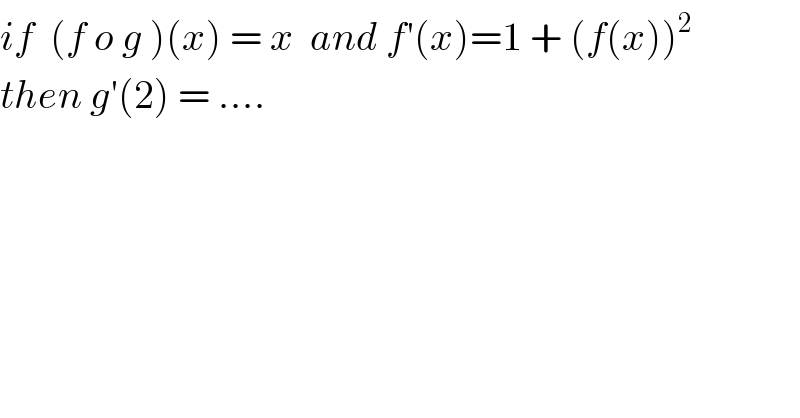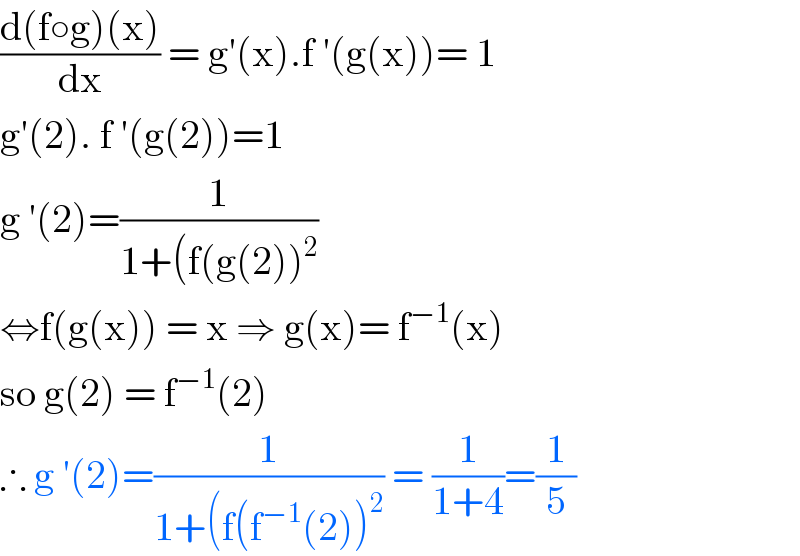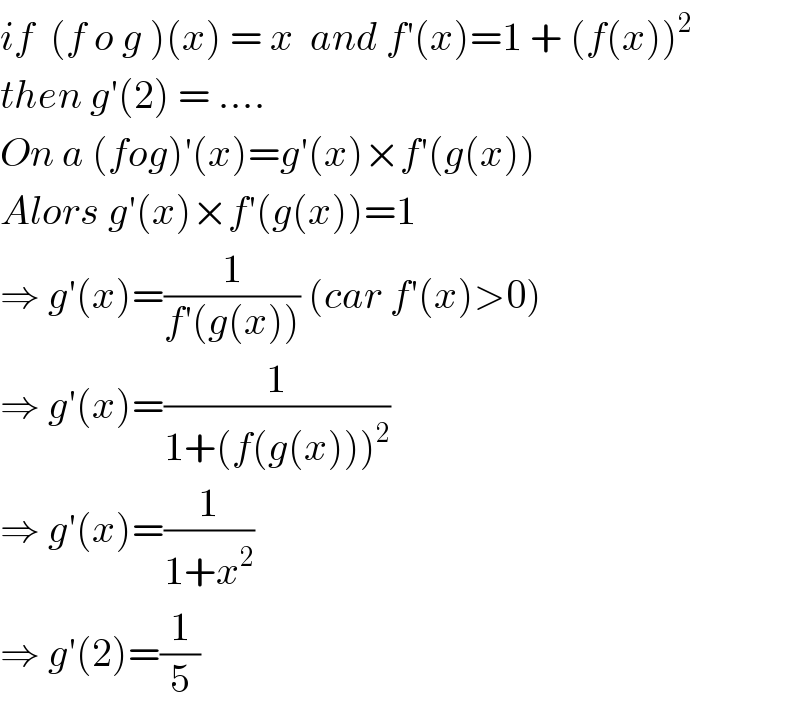
Question Number 106039 by 175mohamed last updated on 02/Aug/20

$${if}\:\:\left({f}\:{o}\:{g}\:\right)\left({x}\right)\:=\:{x}\:\:{and}\:{f}'\left({x}\right)=\mathrm{1}\:+\:\left({f}\left({x}\right)\right)^{\mathrm{2}} \\ $$$${then}\:{g}'\left(\mathrm{2}\right)\:=\:.... \\ $$$$ \\ $$
Answered by bemath last updated on 02/Aug/20

$$\frac{\mathrm{d}\left(\mathrm{f}\circ\mathrm{g}\right)\left(\mathrm{x}\right)}{\mathrm{dx}}\:=\:\mathrm{g}'\left(\mathrm{x}\right).\mathrm{f}\:'\left(\mathrm{g}\left(\mathrm{x}\right)\right)=\:\mathrm{1} \\ $$$$\mathrm{g}'\left(\mathrm{2}\right).\:\mathrm{f}\:'\left(\mathrm{g}\left(\mathrm{2}\right)\right)=\mathrm{1} \\ $$$$\mathrm{g}\:'\left(\mathrm{2}\right)=\frac{\mathrm{1}}{\mathrm{1}+\left(\mathrm{f}\left(\mathrm{g}\left(\mathrm{2}\right)\right)^{\mathrm{2}} \right.} \\ $$$$\Leftrightarrow\mathrm{f}\left(\mathrm{g}\left(\mathrm{x}\right)\right)\:=\:\mathrm{x}\:\Rightarrow\:\mathrm{g}\left(\mathrm{x}\right)=\:\mathrm{f}^{−\mathrm{1}} \left(\mathrm{x}\right) \\ $$$$\mathrm{so}\:\mathrm{g}\left(\mathrm{2}\right)\:=\:\mathrm{f}^{−\mathrm{1}} \left(\mathrm{2}\right) \\ $$$$\therefore\:\mathrm{g}\:'\left(\mathrm{2}\right)=\frac{\mathrm{1}}{\mathrm{1}+\left(\mathrm{f}\left(\mathrm{f}^{−\mathrm{1}} \left(\mathrm{2}\right)\right)^{\mathrm{2}} \right.}\:=\:\frac{\mathrm{1}}{\mathrm{1}+\mathrm{4}}=\frac{\mathrm{1}}{\mathrm{5}} \\ $$
Answered by maouame last updated on 02/Aug/20

$${if}\:\:\left({f}\:{o}\:{g}\:\right)\left({x}\right)\:=\:{x}\:\:{and}\:{f}'\left({x}\right)=\mathrm{1}\:+\:\left({f}\left({x}\right)\right)^{\mathrm{2}} \\ $$$${then}\:{g}'\left(\mathrm{2}\right)\:=\:.... \\ $$$${On}\:{a}\:\left({fog}\right)'\left({x}\right)={g}'\left({x}\right)×{f}'\left({g}\left({x}\right)\right) \\ $$$${Alors}\:{g}'\left({x}\right)×{f}'\left({g}\left({x}\right)\right)=\mathrm{1} \\ $$$$\Rightarrow\:{g}'\left({x}\right)=\frac{\mathrm{1}}{{f}'\left({g}\left({x}\right)\right)}\:\left({car}\:{f}'\left({x}\right)>\mathrm{0}\right) \\ $$$$\Rightarrow\:{g}'\left({x}\right)=\frac{\mathrm{1}}{\mathrm{1}+\left({f}\left({g}\left({x}\right)\right)\right)^{\mathrm{2}} } \\ $$$$\Rightarrow\:{g}'\left({x}\right)=\frac{\mathrm{1}}{\mathrm{1}+{x}^{\mathrm{2}} } \\ $$$$\Rightarrow\:{g}'\left(\mathrm{2}\right)=\frac{\mathrm{1}}{\mathrm{5}} \\ $$
Answered by mathmax by abdo last updated on 02/Aug/20

$$\mathrm{fog}\left(\mathrm{x}\right)=\mathrm{x}\:\Rightarrow\mathrm{f}^{'} \left(\mathrm{g}\left(\mathrm{x}\right)\right).\mathrm{g}^{'} \left(\mathrm{x}\right)=\mathrm{1}\:\:\mathrm{but}\:\mathrm{f}^{'} \left(\mathrm{x}\right)=\mathrm{1}+\left(\mathrm{f}\left(\mathrm{x}\right)\right)^{\mathrm{2}} \:\Rightarrow \\ $$$$\mathrm{f}^{'} \left(\mathrm{g}\left(\mathrm{x}\right)\right)\:=\mathrm{1}+\left(\mathrm{fog}\left(\mathrm{x}\right)\right)^{\mathrm{2}} \:=\mathrm{1}+\mathrm{x}^{\mathrm{2}} \:\Rightarrow\mathrm{f}^{'} \left(\mathrm{g}\left(\mathrm{2}\right)\right)=\mathrm{1}+\mathrm{2}^{\mathrm{2}} \:=\mathrm{5}\:\mathrm{and} \\ $$$$\mathrm{f}^{'} \left(\mathrm{g}\left(\mathrm{2}\right)\right).\mathrm{g}^{'} \left(\mathrm{2}\right)\:=\mathrm{1}\:\Rightarrow\mathrm{g}^{'} \left(\mathrm{2}\right)\:=\frac{\mathrm{1}}{\mathrm{5}} \\ $$
